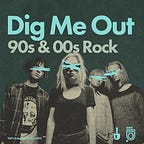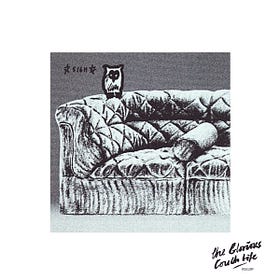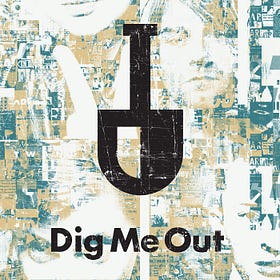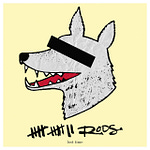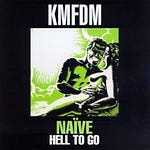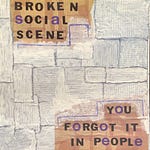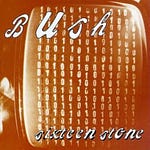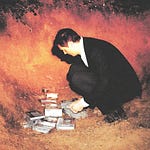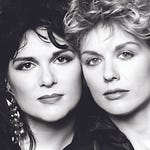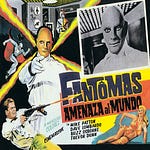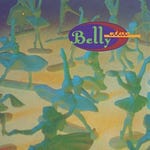Chosen by Australian Josh Page, Sand On Seven by Not From There is our latest deep cut—an album that thrives on jagged bass riffs, hypnotic German vocals, and fearless genre jumps. Want to see your pick featured next and join us for the discussion? Head over to our Patreon, join our Board of Directors, and steer the show with your own obscure gem.
Have you ever hit play on an album and felt like you’d unlocked some hidden code, a gateway into a new world of sound? You know that thrill when you realize you’ve been sleeping on something mind-blowing, right under your nose?
London, 1991. An Austrian guitarist named Heinz Riegler meets two Australian expat musicians in a city where none of them belong. They form a band, naturally calling themselves “Not From There” – because when you’re all immigrants floating between countries, why not own the displacement?
But here’s where it gets wild. Immigration authorities keep breaking them up like some cosmic joke. Hills and Lambert get deported from the UK back to Australia. Riegler follows. Then Riegler gets deported from Australia back to Austria in 1995. Finally, in 1996, he makes it back to Australia legally and permanently.
Talk about earning your right to make music.
The Sound That Shouldn’t Work But Does
When these three musical nomads finally settled in Brisbane and got serious about recording, they created something that defies easy categorization. Sand On Seven, released in 1998, won the ARIA Award for Best Adult Alternative Album in 1999 – beating out established acts in a year dominated by Powderfinger’s Internationalist and Silverchair’s Neon Ballroom.
The genius lies in the contradictions. Take the opening track “Hurricane Charlie,” where producer Magoo – the same Magoo who won ARIA Awards for Regurgitator’s Unit – lets the feedback from Anthony Hills’ fuzzed-out bass actually become part of the riff itself. It’s not just bass-heavy; it’s bass-driven in a way that makes you rethink what rhythm sections can do.
Then there’s the vocals. Riegler’s delivery splits the difference between Jarvis Cocker’s cool detachment and Girls Against Boys’ controlled aggression. He sings some tracks in German – including “Sich Öffnen,” which cracked Triple J’s Hottest 100 despite being entirely in a foreign language. In 1998 Australia, that was practically revolutionary.
Post-Rock Meets Punk Urgency
What makes Sand On Seven fascinating is how it predicted where alternative rock would go. This is 1998, remember – before “post-rock” became a genre everyone threw around. Yet songs like “Juanita’s Cocktail Party” contain these sudden angular shifts that flip from punk urgency into experimental territory and back again, like musical whiplash that somehow feels intentional.
The album’s construction around melodic bass lines – particularly Hills’ work on tracks like “The Corkscrew” – creates this foundation where guitars can get weird without losing the listener. It’s melodic enough to grab you, experimental enough to challenge you, and noisy enough to remind you that rock music should have some danger in it.
The quieter moments, like “Neurons” and the gorgeous “N,” show a band equally comfortable with dreamy, Pink Floyd-influenced passages as they are with feedback-drenched assault. “Abgedroschen” – sung entirely in German – creates this atmospheric interlude that somehow prepares you for “The Orb of Discomfort,” which sounds like Devo having a nervous breakdown.
The Album That Influenced No One (Because No One Heard It)
Here’s the tragic irony: Sand On Seven was perfectly positioned to become influential. It had radio success with “Sich Öffnen,” critical acclaim via the ARIA win, and the backing of Magoo’s production prowess. The album even got released in the US on Cool Arrow Records and Japan with promotional support.
But Not From There vanished almost as quickly as they arrived. They released one more album – Latvian Lovers in 2000 – then broke up by 2001. Three guys who’d spent the entire ’90s fighting deportation orders finally got their moment of recognition, then promptly decided they were done.
Riegler later admitted the ARIA win felt like “the kiss of death”. Maybe he was right. Sometimes recognition comes at exactly the wrong moment, when a band has already said everything they needed to say.
Why This Matters Now
In an era where “alternative” has become meaningless and “indie” describes major-label artists, Sand On Seven reminds us what genuine artistic risk sounds like. This is a record that won a major industry award while featuring German vocals, feedback solos, and song structures that prioritize adventure over accessibility.
It’s also a perfect time capsule of late-‘90s Australian alternative rock – that moment when bands like Regurgitator, Spiderbait, and Magic Dirt were proving you could be experimental without being pretentious. The country’s robust support system of Triple J radio, the Big Day Out festival, and rage TV program created space for bands this adventurous to actually find audiences.
Not From There existed in that sweet spot where underground credibility met mainstream recognition – before those became mutually exclusive territories.
The Lost Art of Controlled Chaos
What strikes you most about Sand On Seven is its confidence. These weren’t musicians trying to prove they were weird; they were weird musicians trying to make great songs. The feedback serves the melody. The German lyrics enhance rather than alienate. The post-rock experiments emerge naturally from the punk foundation.
It’s the kind of record that reminds you why discovery matters – why digging through the crates and following obscure recommendations can still yield genuine treasures. In a time when algorithms predict your next favorite song, Sand On Seven represents something more valuable: the beautiful unpredictability of human creativity.
Sometimes the most important albums are the ones that slip through the cracks, waiting decades for listeners ready to understand what they were trying to accomplish. Not From There made a record that was ahead of its time, behind its time, and completely outside of time all at once.
Songs in this Episode
Intro - Sich Öffnen
10:57 - Hurricane Charlie
14:57 - Neurons
16:57 - Juanita's Cocktail Party
19:52 - The Orb of Discomfort
26:18 - Abgedroschen
Outro - What Is Better Now
Pollen - The Glorious Couch Life | 90s Rock Album Revisited
In the bustling indie music scene of the 90s, where every band was vying to leave its mark, one band slipped through the cracks, only to be rediscovered like a hidden treasure. That band is Pollen. Starting in Sydney before leaping to Brisbane, these guys had the chops to stand out. Brisbane, with its legacy of producing solid rock acts like Powderfinge…
#306: Unit by Regurgitator
Our latest requested review features a band from Australian we were completely unfamiliar with - Regurgitator. Their second album Unit came out in 1997, going triple platinum, producing hit singles and winning music awards. It’s an eclectic mix of pop, rock and punk powered by ‘80s synth sounds and melodies galore. We previously encountered
Glide - Open Up and Croon | 90s Album Review
The story of Glide is one of potential cut short with the death of lead singer William Arthur before the end of the decade. Commanding a voice with equal parts sneer and croon, the appropriately titled debut Open Up & Croon from 1995 manages to fuse a variety of sounds into a coherent vision. Jangly acoustic guitars accompany fuzzed electrics and a pote…


